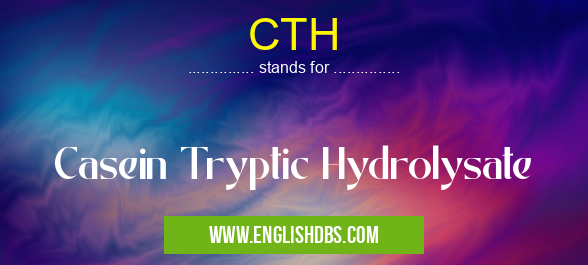What does CTH mean in UNCLASSIFIED
CTH stands for Casein Tryptic Hydrolysate. It is a hydrolyzed form of casein, a protein found in milk. Casein Tryptic Hydrolysate is produced by the enzymatic breakdown of casein using the enzyme trypsin. This process breaks down the casein into smaller peptides and amino acids, making it easier to digest and absorb.

CTH meaning in Unclassified in Miscellaneous
CTH mostly used in an acronym Unclassified in Category Miscellaneous that means Casein Tryptic Hydrolysate
Shorthand: CTH,
Full Form: Casein Tryptic Hydrolysate
For more information of "Casein Tryptic Hydrolysate", see the section below.
CTH in Nutrition
CTH is a valuable source of protein for individuals with allergies or sensitivities to intact casein. It is also a suitable protein source for those who have difficulty digesting other forms of protein, such as those with pancreatic insufficiency or malabsorption disorders.
Applications of CTH
- Infant formula: CTH is often used as a protein source in infant formula for babies with cow's milk protein allergy or intolerance.
- Medical nutrition: CTH is used in medical nutrition products for individuals with specific dietary needs, such as those recovering from surgery or those with digestive disorders.
- Food industry: CTH is used as a food additive to enhance the nutritional value of processed foods, such as baked goods, soups, and beverages.
Benefits of CTH
- Digestible: CTH is easily digestible and absorbed, making it suitable for individuals with digestive issues.
- Hypoallergenic: CTH is hypoallergenic and does not contain the allergens found in intact casein.
- Nutritional value: CTH is a complete protein that provides all the essential amino acids required for human health.
Essential Questions and Answers on Casein Tryptic Hydrolysate in "MISCELLANEOUS»UNFILED"
What is Casein Tryptic Hydrolysate (CTH)?
Casein Tryptic Hydrolysate is a highly digestible form of protein derived from cow's milk. It is produced by breaking down the complex casein protein into smaller, easily absorbable peptides using the enzyme trypsin.
Why is CTH used in infant formula?
CTH is commonly used in infant formula because it is hypoallergenic and easy to digest. It is suitable for infants with cow's milk protein allergies or sensitivities, as the hydrolysis process breaks down the allergenic proteins.
What are the benefits of using CTH in infant formula?
Using CTH in infant formula offers several benefits:
- Hypoallergenic: It minimizes the risk of allergic reactions in infants with cow's milk protein allergies.
- Easy digestion: The hydrolyzed protein is more easily broken down and absorbed by the infant's digestive system.
- Improved nutrient absorption: The smaller peptides in CTH allow for better absorption of essential nutrients, such as amino acids, calcium, and iron.
Is CTH different from whey protein hydrolysate?
Yes, CTH and whey protein hydrolysate are derived from different proteins. CTH is obtained from casein, while whey protein hydrolysate comes from whey protein. Casein is a slow-digesting protein, while whey is a fast-digesting protein.
Are there any potential drawbacks to using CTH in infant formula?
CTH is generally safe and well-tolerated, but some potential drawbacks include:
- Bitter taste: The hydrolysis process can result in a slightly bitter taste, which some infants may dislike.
- Higher cost: CTH-based infant formula can be more expensive than regular formula.
- May not be suitable for all infants: While CTH is hypoallergenic, it may not be suitable for infants with severe milk allergies or multiple food allergies.
Final Words: CTH is a processed form of casein that is easily digestible and hypoallergenic. It is a valuable protein source for individuals with allergies or digestive issues and is widely used in medical nutrition and the food industry.
CTH also stands for: |
|
| All stands for CTH |
